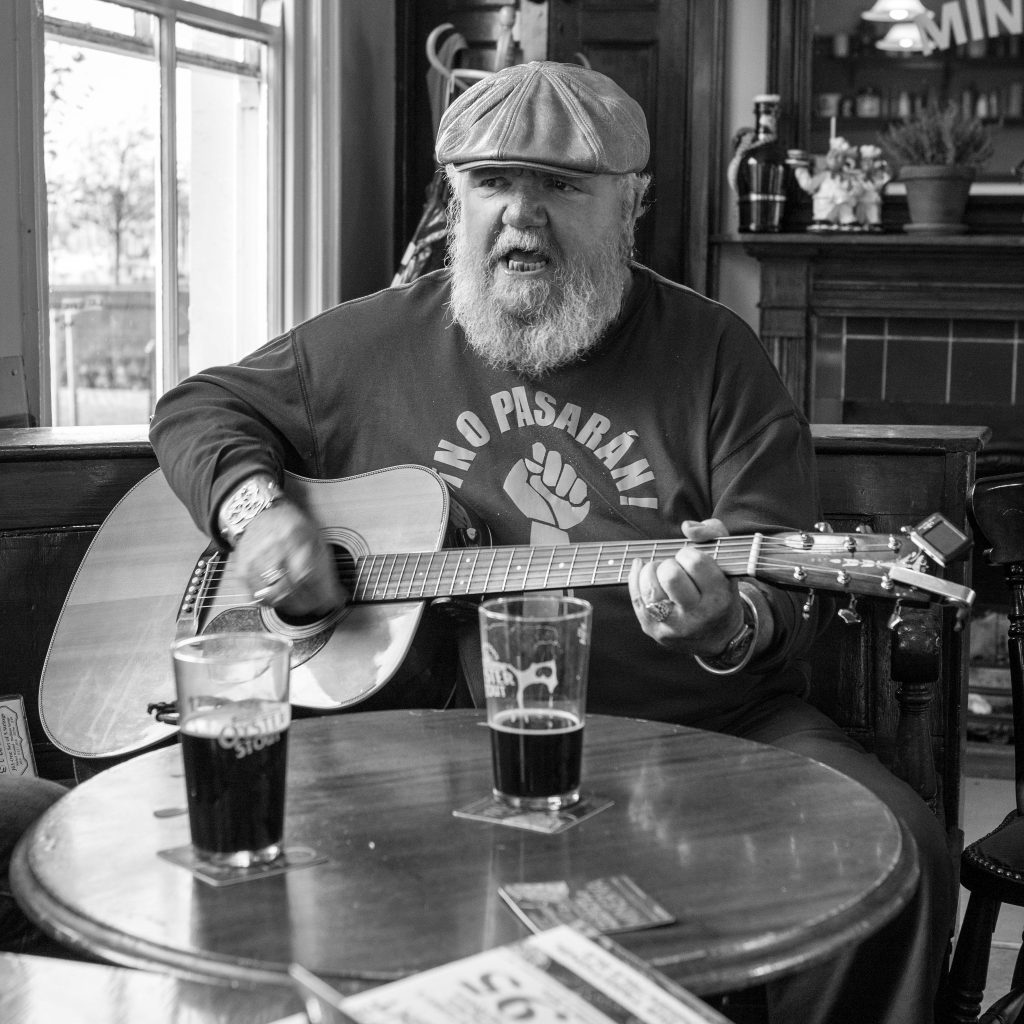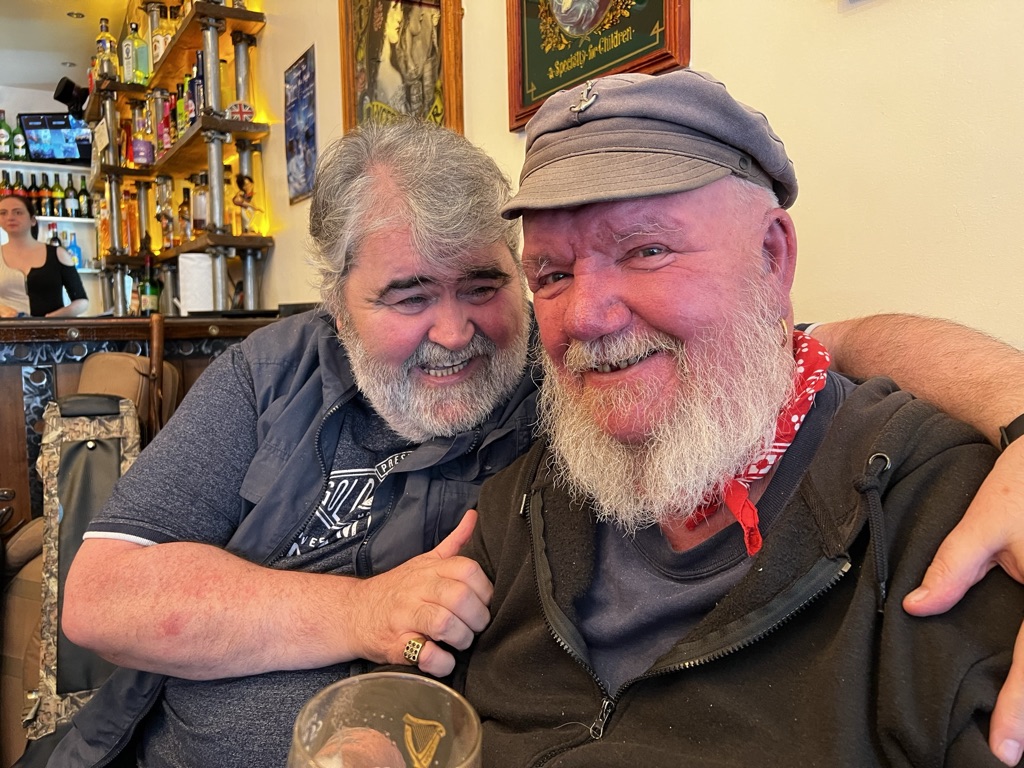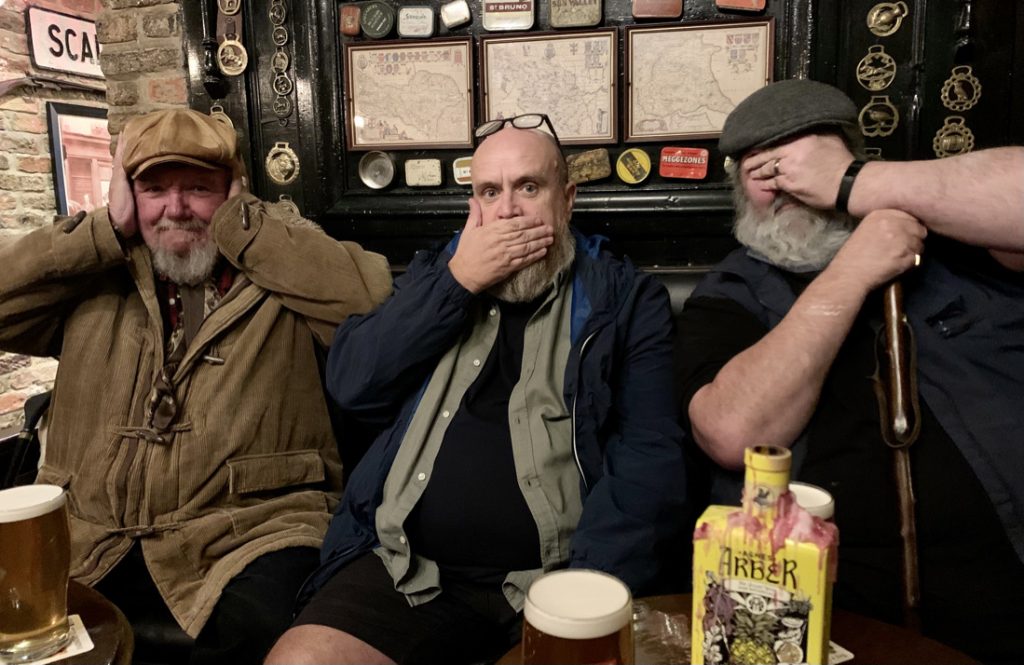We were deeply saddened by the loss of our much-loved and respected bandmate, Mick McGarry, in March 2023.
Mick will always be remembered as a larger-than-life character. With his huge singing talent, musicianship and enormous repertoire of songs, he was a consummate performer and highly respected member of the band.
His sphere of influence was huge and stretched from not only the local music scene, but to the whole of the UK, Ireland and literally around the world.

Mick was a generous man in his support of numerous charities and worthwhile causes, and he would often freely give of his time and the benefit of his experience. He also showed immense support for new and aspiring performers especially in and around the local music scene in Hull.
We will miss Mick greatly and we offer our love and support to his devoted wife Mary, and to all of his family and friends.
We will be continuing as a five-piece – as to carry on singing is the most fitting way to honour Mick’s memory.
Rest in peace, our good friend and bandmate.
Spare Hands
OBITUARY by Brian W Lavery
Mick – who was widely known and highly respected throughout the city and the wider folk scene – died in the Azores on March 1, 2023, after a short illness that followed a fall onboard ship while on a luxury cruise with his wife, Mary. He was 77.
Mick, a lifelong socialist and GMB activist, was a well-known solo singer as well as a member of several groups including Punch the Horse, the Hillbilly Troupe, McGarry-Nelson (with the late singer/songwriter Brian Nelson) – and of course a founder member of Spare Hands.
He was also known as a great encourager of new talent and the regular open sessions he hosted at the city’s Minerva, Ye Olde Black Boy, and later at Vintage Bar pubs were venues where many first-time acts were guided by Mick in his own selfless and inimitable style.
On March 27, 2023, hundreds gathered at Hull Minster to celebrate his life.
Radical singer-songwriters Reg Meuross and Rory McLeod led a cast of musicians, poets, writers, activists and family in tribute.
The last time Mick was at the Minster was as part of Reg’s song cycle 12 Silk Handkerchiefs inspired by the story of the Headscarf Revolutionaries and the 1968 Triple Trawler Disaster.
Mick had joined friends and fellow musicians Reg Meuross and Sam Hawcroft (aka Sam Martyn) alongside writer Brian Lavery in a English tour of the show, which culminated in a finale at the Minster.
The Lord Mayor of Hull, last of the Headscarf Revolutionaries, the late Yvonne Blenkinsop and an audience made of VIPs and many members of the Hessle Road fishing community gave a standing ovation that night.

Mick with Brian
Brian, a close friend to Mick for decades, gave the eulogy at the celebration of his life and introduced a host of guests who sang and recited heartfelt tributes.
The congregation at the 600-year-old church were greeted by the music of Uillean piper – and long-time friend of Mick – Dicky Deegan.
GMB members, led by lifelong friend and comrade Les Dobbs, unfurled their banners in tribute.
Brian recounted many stories, anecdotes and memories of Mick and the audience joined in the laughter and the sadder moments too.
He introduced fiddler David Oakley – who played a tune he dedicated to Mick simply called, McGarry. The tune featured in Mick’s album Raggy Lad recorded to mark his 65th birthday, (check this please) some fourteen years ago.
There were further musical tributes from Sam Martyn, Lloyd Dobbs (ex-Paddingtons and Hillbilly Troupe founder), Linda Kelly, Zoe Bottomley as well as humorous verse from Mick’s favourite Hull poet Lucy Thompson.
The McGarry family – led by Mick’s son Dan and daughter Joanne – were joined by his grandchildren in a touching set of reminiscences.
The Minster event was followed up at the Humber Street Social club for “one last big session” for Mick.
The acts from the Minster were joined by others for a concert, led again by Reg Meuross and hosted by Mark Pollard.
That event started at 12.30pm and went on into the evening followed by a session hosted by Andy Buckton (of Spare Hands) and Lloyd Dobbs, started at 5pm until late in the true McGarry style.
The concert line up included: The Hillbilly Troupe, Jean Weatherill, Beggars Bridge, Dirty Buskers, Lyn Acton, Reg Meuross, Ellie Pollard, Spare Hands, and Rory McLeod – compere Mark Pollard also performed.
Mick’s wife of more than 40 years, Mary, was kind enough to recount key moments of her late husband’s life for this obituary.
The story all began in “another city of culture” – wartime Coventry.
It was also revealed that Hull’s legend Mick was in fact an “accidental Yellowbelly” born in Lincolnshire – or the wrong side of the river as Hull folk call it!
It was something Mick would often joke about.
Mary recalled: “Mick’s parents met in Coventry during the Second World War. Marjorie was making parts for Spitfires in a shadow factory.
“And Joe was sent from Kent to lay bricks, which was a reserved occupation. They settled in Hull to be near her family.
“Heavy bombing caused Hedon Road Maternity Hospital to be evacuated. Consequently on VE Day, Mick was the last of 3,000 babies to be born at Gate Burton Hall near Gainsborough, Lincolnshire.
“Joe was persuaded by his brother in law to become a merchant seaman, spending Mick’s early childhood overseas, initially clearing mines off the coast of Australia.
“Meanwhile, Marjorie taught Mick to read fluently before he was three years old, and continued his subscription to The Beano comic for 32 years!
“Sweets were strictly rationed [in wartime] and Mick’s first paid gigs at this time were seated on a shop counter singing The Little Boy that Santa Claus Forgot – and similar songs in return for payment in kind with sweets.
“Besides a love of the pub, Mick inherited a fine singing voice from his father, and the joy of sharing it with any assembled company.
“At school Mick really only liked the music and history lessons and left aged 15 to work, at first on tugs in the River Humber, then sailing all over the world.
“As his father before him, he didn’t really see much of all the countries he visited beyond the nearest dockside pub!
“Parting company with the merchant navy Mick embarked on an itinerant career building motorways and laying train tracks for power stations. He lived for many years in London, Leeds, Gateshead and Southampton.
“The Irish gangs he worked with respected him as a grafter by day and his ability to give a song or three every night in the pub.
“Musically, Luke Kelly was his hero.
“He also came across Vin Garbutt, Christy Moore and Dick Gaughan on their travels, making friends and following their musical careers.
“Back in Hull on a visit he took up with Jock Manuel, [correct] a fine Scottish ballad singer and Brian Tozer [correct] a potter based at Spring Street Theatre.
The Bluebell and Rugby Tavern folk clubs were at their peak then and Mick moved into a shared flat down St George’s Road and decided to stay a while.”

Mary recalled Mick’s early years on the music scene in Hull and beyond, saying: “Mick enjoyed listening to the Watersons after meeting them at the Jacaranda coffee club, deepening his love of unaccompanied singing.
“The bar at Spring Street Theatre, run largely by volunteers, had serious cash flow problems.
“Brian Tozer suggested Mick help out and in a few short months he turned it into a profitable enterprise.
“Exhibitions were staged in the foyer so the bar could remain open between shows. A widening circle of friends, including many musicians and artists began to visit on a regular basis, to keep Mick company.
“I came in with a group of art teachers one Friday night in May. It was a week after Mick had just turned thirty-two.”
Mick later met up with Mary again in the Black Boy pub on the Sunday and then in the Bluebell a week later.
Not long afterwards Mary and Mick planned a camping holiday in Ireland and decided on a very quiet wedding on their return.
Mick left the theatre for a better-paid job to support his family before Joanne and Dan were born.
After a few false starts he took temporary work delivering new cars from the docks. Fortunately he had recently passed his driving test and was able to travel all over the country earning serious money.
Hull City Council employed Mick laying up to seventeen tons of Tarmac a day. He rejoined the GMB union and took a very active part in all the meetings with management including a total re-evaluation of all employees’ job descriptions.
Mary said: “Perhaps because of all these meetings, early one morning Mick picked up a shovel of Tarmac, turned awkwardly and twisted his back and was sent home in great pain.
“Although he was well qualified for several other vacancies, such was his success as a union rep that Hull City Council wanted rid of Mick at any cost.
“For example their doctor, said Mick could not become a wheelie-bin inspector as he’d never be able to pick one up!”
So it was no surprise that when he secured a building supervisor position at Hull College Mick thought it best to play down his trade union work for a short while.
But that was not to be.
As soon as he started a workplace branch, membership grew rapidly and many improvements were made to their terms and conditions including training for health and safety representatives.
Mick also developed his own IT skills attending the two year IOSH course with his friend Les Dobbs.
And the music continued playing its part too.
Punch the Horse, with Mick as lead singer, played Irish music in pubs across sixteen years, bringing pleasure to audiences within a fifty mile radius of Hull.
Mary added: “In that time the band had three different guitarists and three fiddle players (two of whom attended the event in the Minster), and the multi-instrumentalist John Smith plus, almost from the beginning, the ever-faithful Andy Watson.
“Mick had only started playing guitar, just before he later joined both Hillbilly Troupe and Spare Hands, and forming the McGarry Nelson duo too, embarking on a range of fresh musical adventures.”
When I was paying tribute to my friend and comrade Mick in the Minster on that spring day, I could not help but think of an inscription from another place of worship in another city.
In London’s St Paul’s Cathedral the epitaph to its designer Sir Christopher Wren reads: “Si monumentum requrius circumspicere” – (“If you seek his monument look around you.”)
As I looked around me that day at the Minster and later at the concert in my dear friend’s honour I saw smiles and tears, heard laughter, song, verse and tribute.
It was a monument I did not have to go far to seek.
A joyful celebration of a life-affirming man, a class artist, a class warrior and a class act, held in high regard, respect and esteem.
Brian W Lavery